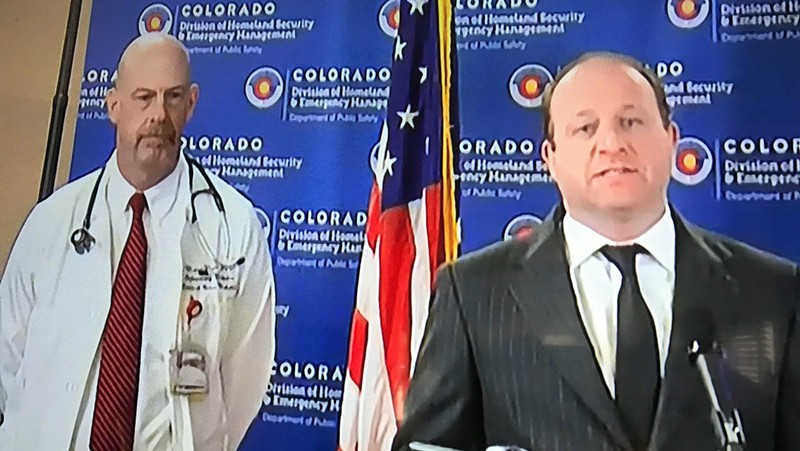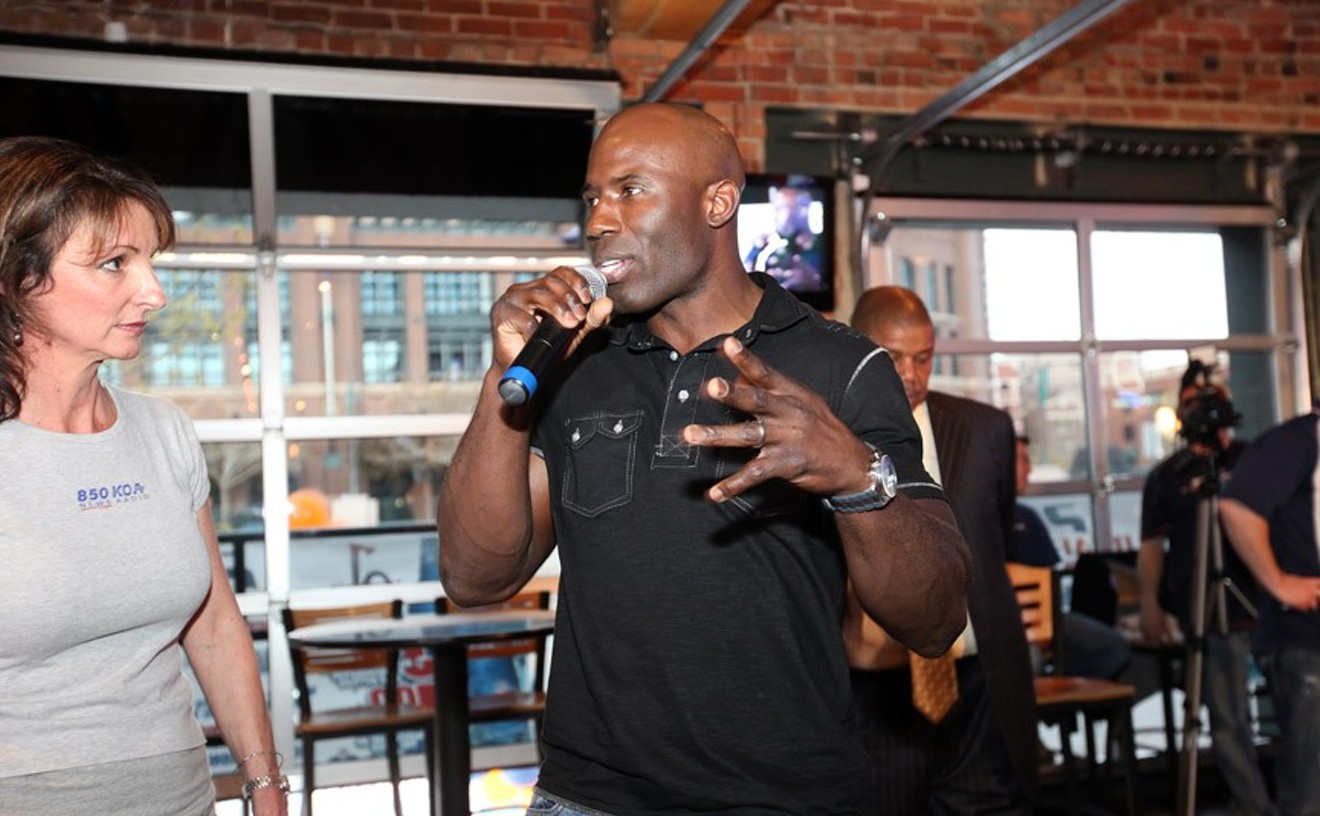During a March 30 press conference at the Emergency Operations Center in Centennial, Governor Jared Polis shared some potentially positive news about the fight against COVID-19 in Colorado, including an early indication that the rate of the virus's spread may be slowing. But he also revealed the first death in the state of an individual under age forty, and the University of Colorado Denver's Dr. Marc Moss, who also spoke during the event, offered unnerving descriptions of the infection's power that he summed up in a simple but impactful observation: "The COVID-19 epidemic is real, and it's scary."
At the outset of his remarks, Polis noted that on the evening of March 28, Colorado formally secured a major disaster declaration from the federal government — an action that "unlocks access to additional resources." This morning, he spoke on the telephone with President Donald Trump and Vice President Mike Pence; Polis said he thanked them both for making this development possible.
Polis also shared with Trump and Pence his gratitude for the work of the National Guard in Colorado, where it has helped handle logistics for ten mobile-testing sites, as well as for efforts by the Army Corps of Engineers, which has been helping to increase hospital capacity, among other things. The disaster status means that federal resources will pay for many of these efforts.
After that, Polis turned to the Bible for inspiration, as he had during a March 27 press conference, when he quoted from the third chapter of Ecclesiastes. This time around, he referenced First Corinthians, chapter 13: "And now these three remain: faith, hope and love. But the greatest of these is love." He then encouraged Coloradans who are following his ongoing stay-at-home order to reach out virtually to those closest to them, to make sure the message of love spreads even faster than the novel coronavirus.
At that point, Polis presented a series of slides, much as he had on March 27, with the first intended to underscore that people of all ages are in danger from COVID-19, even if the majority of fatalities thus far have taken place among those who are sixty or older.
Along the way, he shared what he called "partial update figures" from the Colorado Department of Public Health and Environment in advance of their usual late-afternoon release time: 2,627 positive cases in 47 Colorado counties, 414 hospitalizations, 15,364 tests given and 51 deaths. "We also had our first death of somebody under forty years old," Polis allowed.
Still, approximately 80 to 85 percent of those who contract COVID-19 won't require hospitalization or intensive treatment, "and will self-resolve," he pointed out. "If you do have symptoms, it's important that you completely self-isolate until at least several days after the symptoms subside. If you do have flu-like symptoms, COVID-19-like symptoms, don't panic. If you need medical attention, don't hesitate to get it. But if you don't need immediate medical attention, you need to stay in your home and self-isolate."
Another slide illustrated shortfalls in the number of masks, face shields, gloves and gowns needed to treat COVID-19 patients — many of them in the hundreds of thousands. "I articulated these needs to the president and vice president on the phone this morning," Polis emphasized.
The lag time for the virus's incubation period (usually four to five days, though it can be as long as seven to eight days) means that Colorado is only now seeing the impact of early moves to contain the outbreak, including the closure of schools, restaurants, bars and clubs; other effects will likely be better understood in a week or so. But Polis said that he was cheered by data suggesting that the number of cases, which had been doubling every two days or even less, now appears to be seeing this increase every five days. That's not nearly good enough, he acknowledged, but "it buys us a little time," even though the huge number of people who have neither been tested nor diagnosed make definitive conclusions difficult.
Also positive from Polis's perspective are Colorado Department of Transportation statistics showing that traffic volume on most of the state's roadways is down by as much as 60 percent. He was especially heartened to see the reductions at the Eisenhower Tunnel, the "main gateway from Denver metro to the mountain communities," which he again tried to dissuade non-residents from visiting because of their high infection rates.
For an insider's view about the health-care challenges, Polis called on Moss, representing the many thousands of medical workers involved in the current battle. Moss divulged that the CU hospital currently has 72 patients with COVID-19, one who's just nineteen. Among these patients, 37 are critically ill and 33 on mechanical life support — ventilators. That's more than twice the number of intensive-care patients the facility typically serves on a given day, "and we're only at the beginning of this crisis," he said.
COVID-19 sufferers "can go from requiring a bit of extra oxygen to needing to be put on a ventilator within a few hours, but they take a much longer time to get better," Moss continued, noting that critically ill patients who survive may need to be on a ventilator for two weeks or longer. This need puts "more of a strain on resources," not to mention medical professionals.
Moss called it "a difficult and scary environment" for individuals who are "literally putting their lives on the line for their patients." More than fifty doctors in Italy have died from the virus, he noted, "and in Colorado, we are unfortunately seeing health-care professionals starting to test positive. ... That hampers our response, because it sidelines critical medical staff," such as one colleague of Moss's who has been unable to assist patients for weeks after her own positive test. She'll be back on the job next week, he predicted.
Moss echoed Polis's plea for more equipment, as well as for Coloradans "to take the pandemic very seriously." He then ceded the stage back to the governor, who again called for folks to show love to family and friends. In his words, "We can get through this together, and the hope will be all the brighter the more love we can show to one another during this crisis."
[
{
"name": "Air - MediumRectangle - Inline Content - Mobile Display Size",
"component": "12017618",
"insertPoint": "2",
"requiredCountToDisplay": "2",
"watchElement": ".fdn-content-body",
"astAdList": [
{
"adType": "rectangle",
"displayTargets": "mobile"
}
]
},{
"name": "Editor Picks",
"component": "17242653",
"insertPoint": "4",
"requiredCountToDisplay": "1",
"watchElement": ".fdn-content-body",
"astAdList": [
{
"adType": "rectangle",
"displayTargets": "desktop|tablet"
},{
"adType": "rectangle",
"displayTargets": "desktop|tablet|mobile"
}
]
},{
"name": "Inline Links",
"component": "18838239",
"insertPoint": "8th",
"startingPoint": 8,
"requiredCountToDisplay": "7",
"maxInsertions": 25
},{
"name": "Air - MediumRectangle - Combo - Inline Content",
"component": "17261320",
"insertPoint": "8th",
"startingPoint": 8,
"requiredCountToDisplay": "7",
"maxInsertions": 25,
"watchElement": ".fdn-content-body",
"astAdList": [
{
"adType": "rectangle",
"displayTargets": "desktop|tablet"
},{
"adType": "rectangle",
"displayTargets": "desktop|tablet|mobile"
}
]
},{
"name": "Inline Links",
"component": "18838239",
"insertPoint": "8th",
"startingPoint": 12,
"requiredCountToDisplay": "11",
"maxInsertions": 25
},{
"name": "Air - Leaderboard Tower - Combo - Inline Content",
"component": "17261321",
"insertPoint": "8th",
"startingPoint": 12,
"requiredCountToDisplay": "11",
"maxInsertions": 25,
"watchElement": ".fdn-content-body",
"astAdList": [
{
"adType": "leaderboardInlineContent",
"displayTargets": "desktop|tablet"
},{
"adType": "tower",
"displayTargets": "mobile"
}
]
}
]












